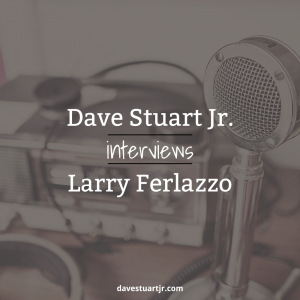
Unless you're reading this post through some sort of snail-mail delivery method, you're probably familiar with at least some of Larry Ferlazzo's prolific work on the Internet. (Here's his blog; here's his column for EdWeek [scroll down to find my two cents].)
When I was preparing the lectures inside of Teaching with Articles, I knew that my own poverty of experience teaching English Language Learners was going to hinder the relevance of the professional development for folks who do teach large populations of ELLs. That's why I reached out to Larry Ferlazzo, who teaches both ELL and advanced classes at Luther Burbank High School in Sacramento, CA. As you'll hear in the interview below, Larry is thoroughly kind, fiercely intelligent, and deeply wise in a way only a long-time teacher could be.
Some highlights from the interview:
- One of Larry's toughest moments as a teacher. (5:30) Larry also touches on when it's okay to use extrinsic motivation (6:30), but what its limitations are. “No one wants to be a rat in the maze.”
- Larry's ‘Aha,' Gandhi-related moment, which I've written about before. (10:00) “The key to Gandhi's success was that he looked at every problem as an opportunity, not as a pain in the butt.” (Again, I wrote about this recently.)
- What should teachers keep in mind when preparing lessons around articles for ELL students in the classroom? (13:00)
- “Good ELL teaching just is good teaching.” (13:20) Larry uses many of the same strategies with his International Baccalaureate students as with his ELL students. “I think it makes me a better IB teacher,” Larry says.
- Close reading. (18:50) Larry discusses how he uses Shanahan's guidance on close reading.
- The “Wingman” strategy. (24:00) Two students discuss a text while a “wingman” takes notes.
- When should ELLs participate in whole-class discussions? (26:15)
- Larry's quick list of tips for teaching ELL students. (28:35) Larry came prepared with more than we had time for; here's a flyover of more great advice.
- Larry's upcoming book. (30:50) “Which includes a lesson inspired by you,” Larry says, as my jaw drops to the desk.
The interview
Please use the embedded player below to listen to the mp3 interview. If it's not working, you can find the mp3 here — download it at your pleasure. Enjoy!
Audio PlayerNotes
Here are Larry's eight (!) books:
- Navigating The Common Core With English Language Learners (with co-author Katie Hull Sypnieski);
- Building A Community Of Self-Motivated Learners: Strategies To Help Students Thrive in School and Beyond;
- Classroom Management Q&As: Expert Strategies for Teaching;
- Self-Driven Learning: Teaching Strategies For Student Motivation;
- The ESL/ELL Teacher’s Survival Guide (with co-author Katie Hull Sypnieski);
- Helping Students Motivate Themselves: Practical Answers To Classroom Challenges;
- English Language Learners: Teaching Strategies That Work;
- and Building Parent Engagement in Schools (with co-author Lorie Hammond).[hr]
Thank you to Larry Ferlazzo for his time in this interview, his kindness in including a bit of my work in his recent Navigating the Common Core with English Language Learners, and, most of all, for the helpful body of work he has created outside of his classroom all while remaining a classroom teacher.
mainsensei says
Looking forward to your thoughts about six essays w one day turnarounds. It seems to contradict your work/life balance philosophy as well as your support of Nancy Atwell’s “I’ve been teaching for ?? years and I’ve never graded an essay” concept. How do you manage to reconcile these? How do you keep from having “mission creep” and grading like this (or feeling bad for NOT grading like this) more often? Go, Dave, go! Stay strong through May!
davestuartjr says
Hi Main,
Great questions.
First, this is for a season — specifically a 1 week long season. I’ve been planned things out so that this week in my other courses I won’t be grading much at all, except for Articles of the Week.
Second, I’m using the same AP World History rubrics I’ve learned and studied all year. Unlike nearly every rubric I’ve used so far in my career, these rubrics are pretty unambiguous once you get the hang of them. This allows me to grade quickly.
And finally, I CAN’T grade like this more than once per year. I do feel a bit bad for not having given more essays throughout the school year, but I just couldn’t. By the end of the course, my APWH students will have written perhaps 15 or so essays, and it should probably be more. But I’ve tried my hardest and will work on increasing efficiencies next year so that I can do a better job. I don’t feel bad because I believe I’ve given the students a great opportunity and a great course that has helped them all. It hasn’t changed their lives, but it has helped. I’ll rest in that.
Thank you, again, for great questions.
mainsensei says
Thanks, for your response! I have yet to master essay grading, let alone planning ahead to pace my assignments so I can keep up with everything without losing my sanity. Who knew that was even a possibility? ???? BTW, I posted before I had listened to the podcast. It’s EXCELLENT! I have quite a few ELLs and this all makes perfect sense. Also, I wanted to thank you not only for your blog and interview, but also for all the AMAZING links you researched and added. I’m so glad I found your blog!